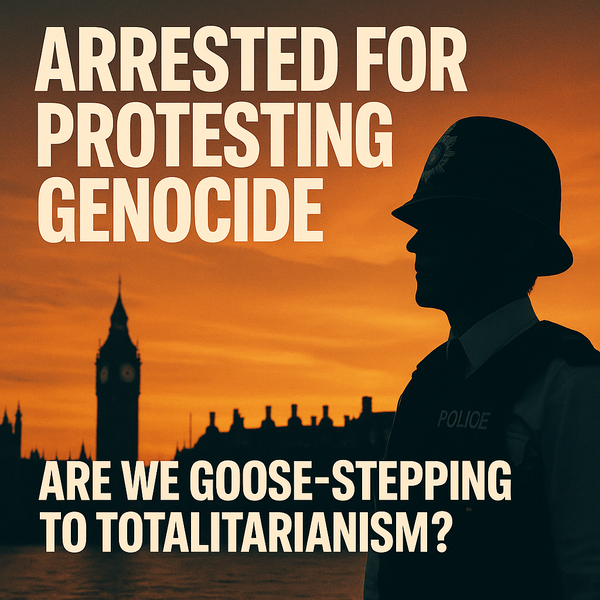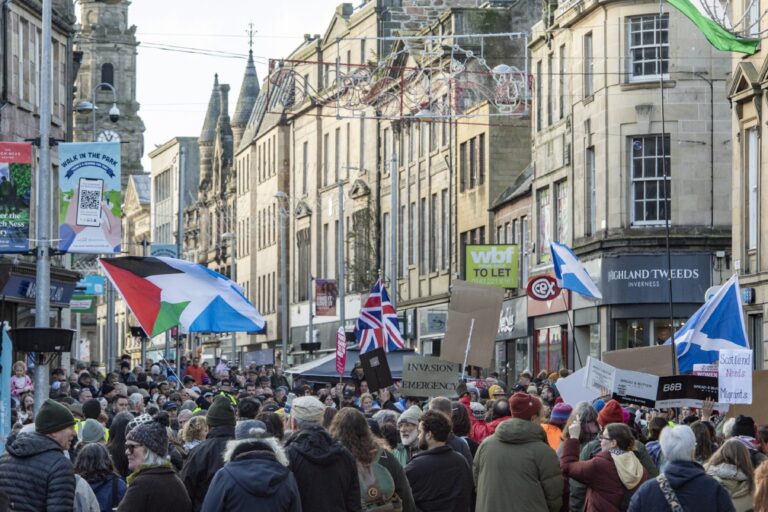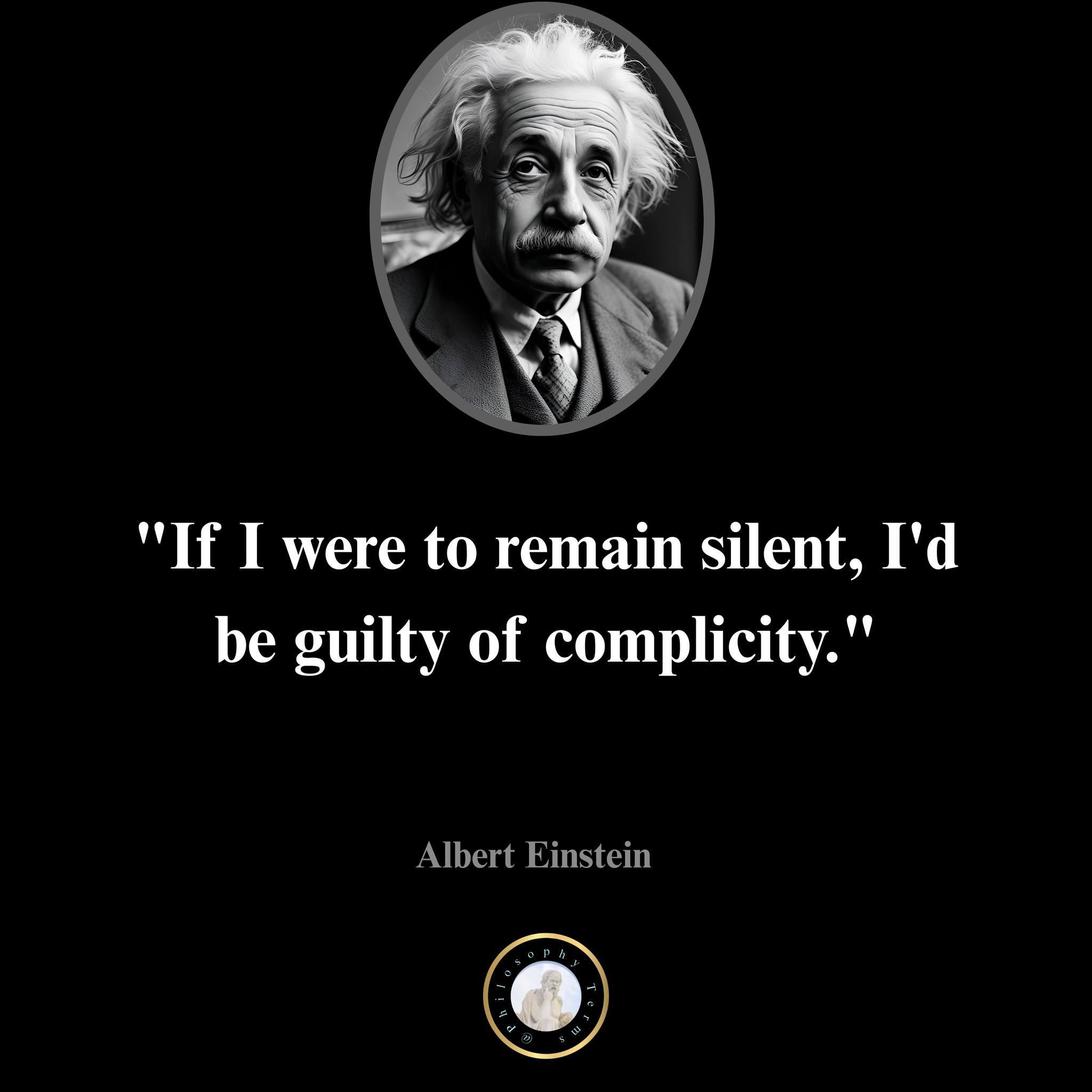The Illusion of Free Speech
On 5 July 2025, just hours after the UK Governmentofficially banned Palestine Action under the Terrorism Act 2000, 29 people werearrested in Parliament Square, London, simply for holding signs that read “Ioppose genocide. I support Palestine Action.” Among those taken into custodywas Rev. Sue Parfitt, an 83-year-old retired priest, peacefully attending thevigil beneath a statue of Mahatma Gandhi.
Protesters had informed the Metropolitan Police in advanceand adhered to a silent, lawful vigil. They demonstrated non-violently insolidarity with Palestinians facing catastrophic violence in Gaza. Withinhours, they were accused of supporting terrorism and hauled away as statesuspects. All of this happened inside Britain’s so-called democracy.
This moment exposes a harsh contradiction. On one side, thegovernment proclaims an unwavering commitment to freedom, the rule of law, anddemocratic values. On the other, it criminalises conscientious protest againstgenocide. So the question stands:
If protesting genocide becomes a crime, what does thatmake the state?
This is not dramatic flourish. It is a real and unfoldingtest of how Britain treats dissent under the banner of national security. Andin the case of Palestine Action, words and cardboard signs have become groundsfor criminal prosecution.
Who Are Palestine Action?
What is Palestine Action?
Founded in 2020 by Huda Ammori and Richard Barnard, Palestine Action is a UKdirect action network built to challenge British complicity in Israeli warcrimes, particularly through targeting Elbit Systems, Israel’s largest weaponsmanufacturer. Their actions include peaceful occupations, sabotage of property,and red-paint strikes symbolising bloodshed, all intended to expose and disruptthe arms trade infrastructure that supports the assault on Gaza.
These acts have drawn national media attention and forced governmentcontractors into the spotlight. As a result, two Elbit-linked sites in Oldhamand London shut down under pressure. Their actions are non-violent, targeted,and rooted in a strategy of civil resistance.
Why the government banned them
On 2 July 2025, the UK Government officially proscribed Palestine Action underthe Terrorism Act 2000. The Home Secretary justified the move by citingproperty damage and disruption to defence-linked infrastructure. This cameshortly after activists reportedly broke into RAF Brize Norton and disabledmilitary aircraft, causing millions in damage.
Parliament voted 385 to 26 in favour of the ban. The House of Lords approved it within 48 hours, and the law came into force at midnight.
Under the Terrorism Act, simply showing support for Palestine Action, displaying their logo, or quoting their slogans can now lead to arrest and up to 14 years in prison. This includes peaceful protest, online expression, and symbolic action. Civil liberties groups, including Liberty and Amnesty International, have condemned the ban as a serious attack on democratic rights.
What they have achieved
Palestine Action has forced public scrutiny of the UK’s military-industrial ties to Israel. Their actions shut down Elbit factories, delayed production,and exposed the UK Government’s deep involvement in the arms trade. They havealso shifted public discourse by making it harder to ignore the role Britainplays in enabling war crimes.
Huda Ammori and others have defended their tactics as non-violent civil disobedience. The movement’s power lies not in brute force but in moral confrontation. They act where governments refuse to and challenge the complicity that most institutions are too comfortable to question.
The State Response
When Palestine Action was officially proscribed under the Terrorism Act 2000 on 5 July 2025, the consequences were swift and aggressive.Authorities launched coordinated enforcement across the country, targeting evenpeaceful supporters who carried signs or simply stood in public spaces.
On the same day the ban took effect, at least 29 people werearrested in Parliament Square, London. The Metropolitan Police justified thearrests on the grounds of showing support for a proscribed organisation. Amongthose detained was Rev Sue Parfitt, aged 83, a retired Anglican priest, alongwith other elderly protesters holding signs that read “I oppose genocide. Isupport Palestine Action.” Police had been informed in advance, and organisershad ensured the vigil would remain silent, lawful, and symbolic.
The crackdown followed a resounding parliamentary vote whereMPs supported the ban 385 to 26. Lawmakers framed Palestine Action’s directaction including the RAF Brize Norton incident where activists disabledaircraft as a threat to national security. The High Court swiftly dismissed thegroup’s attempt to halt the proscription, arguing that the public interestoutweighed concerns of political repression.
Government officials continued to speak of free speech, therule of law, and democratic values. But their actions told another story.Arrests were made under Section 13 of the Terrorism Act, which makes it acriminal offence to display support for a banned organisation. This nowincludes wearing symbols, quoting slogans, or holding signs in public.
Civil liberties groups, UN experts, and organisations likeLiberty and Amnesty International have warned that this marks a dangerousturning point. One senior civil servant from the Home Office reportedlydescribed the policy as absurd, noting that it could lead to arrests simply forcriticising UK arms sales or for calling Israel’s actions genocide.
Beyond arrests, the crackdown has widened. There have beenreports of increased surveillance, home raids, and pressure placed on legalteams and solidarity networks. Activists say this is not policing, butpolitical suppression designed to silence voices of dissent.
This is no longer just about Palestine Action. It is aboutwhether anyone in Britain can safely protest government-backed violence withoutrisking arrest, public smear, or imprisonment. It is a quiet war againstconscience itself.
Genocide in Gaza and the Cost of Saying So
The situation in Gaza has become one of the most urgenthumanitarian crises of our time. United Nations experts, human rights lawyers,and even a former Israeli Supreme Court justice have warned that Israel’smilitary campaign may amount to genocide. The International Criminal Court hasissued arrest warrants against Israeli leaders, alleging crimes againsthumanity and genocide. Despite this, in Britain, supporting Palestine Action’ssymbolic protest has become a path to arrest.
UN experts have urged the UK Government not to misusecounterterrorism powers to stifle legitimate protest, stating clearly thatproperty damage without intent to harm does not meet the legal threshold forterrorism. Amnesty International UK called the decision to ban Palestine Actiona disturbing legal overreach and said the government should focus on endingcomplicity in genocide, not criminalising moral protest.
Yet under the new enforcement powers, activists who simplyhold signs or quote slogans in support of Palestine Action now riskprosecution. During the Parliament Square gathering on 5 July 2025, 29 people includingactivists, health workers, and an 83-year-old priest were arrested for standingsilently with placards expressing opposition to genocide. The MetropolitanPolice justified the arrests under Section 13 of the Terrorism Act, whichcriminalises any public expression of support for a proscribed group, regardlessof intent or context.
Activists such as Tim Crosland from Defend Our Juries saidthe arrests show the absurdity of Britain’s new protest laws. He noted thatpeople were treated as criminals for carrying cardboard signs and standing insilence. Civil liberties groups and UN-appointed legal experts have warned thatthis legal threshold could chill freedom of speech and protest across civilsociety.
Meanwhile, as protest becomes a crime, the state's moralposition becomes harder to defend. Genocide in Gaza may soon be recognised incourt under international law, but in Britain the real crime now appears to benaming it. If raising your voice for the people of Gaza can land you in prison,what does that say about the state that arrests you?
This is no longer theoretical. It is a daily reality forthose who refuse to stay silent. And in that silence, the UK Government becomescomplicit not just in arms sales or diplomatic support, but in criminalisingthe very act of bearing witness.
Hypocrisy on Parade
Western governments loudly applaud Ukrainians for taking upMolotov cocktails or sabotaging military supply lines as brave acts ofresistance. Yet comparable tactics by Palestine Action are instantly brandedextremist, outlawed, and prosecuted as terrorist offences. This stark contrastreveals a moral double standard at the heart of British policy.
In 2023 and 2024, the UK and EU condemned attacks onUkrainian civilian infrastructure as war crimes. Meanwhile, similar actions inGaza were largely ignored or excused. Palestinians who fight occupation aredismissed as terrorists, while Ukrainians are hailed as heroes. To much of theGlobal South, this is blatant hypocrisy.
The banning of Palestine Action on terrorism grounds wasswiftly followed by mass arrests in London. Twenty nine people were detainedfor symbols and slogans while Britain continues to market itself as a democracyand defender of human rights. George Monbiot, writing in The Guardian, calledthe decision a dangerous erosion of democratic norms and an expansion ofrepressive protest laws originally brought in by the Tories. He warned thatactivism near sensitive institutions may soon be outlawed entirely.
Meanwhile, climate activists face some of the harshestsentences in modern British history. Roger Hallam and other Just Stop Oilmembers received multi year prison terms for blocking the M25. Despite causingno harm, they were jailed more harshly than many violent offenders. Legal andUN experts condemned this crackdown as disproportionate and a direct threat todemocratic expression.
Police operations are increasingly being used as tools ofsuppression. Between 2019 and early 2025, Greenpeace UK recorded a tenfoldincrease in arrests under public nuisance laws, yet actual prosecutions remainrare. Many believe the law is now being used not to deliver justice, but tointimidate and silence.
So who are the real extremists? Those who stand in silenceagainst genocide, or those who use the full force of the state to arrest,surveil, and prosecute them?
The hypocrisy is not accidental. It is strategic. Protest ispraised when it aligns with government interests and punished when itchallenges them. Palestine Action may have disrupted business as usual, but itis the state's response that reveals where the real danger lies.
The March Toward Authoritarianism
What began as a campaign against one protest group hasbecome a warning sign for every citizen in the United Kingdom. The state'sresponse to Palestine Action is not an isolated case. It fits a broader patternof legislative creep, surveillance expansion, and the steady criminalisation ofdissent.
The Public Order Act and the Police, Crime, Sentencing andCourts Act have given authorities sweeping new powers. These laws allow policeto preemptively arrest people for protests that might cause disruption. Theyenable restrictions on where and how people can gather, what they can say, andeven how loudly they can speak. They remove the presumed right to protest andreplace it with state permission.
In parallel, courts are increasingly used as tools ofpolitical discipline. Activists are given disproportionate sentences fornonviolent acts. Journalists are threatened with arrest simply for coveringprotests. Legal observers have been detained. Human rights groups have warnedthat the UK is now operating outside the norms of democratic governance.
This is how authoritarianism takes hold. Not throughmilitary coups or sudden crackdowns, but through a slow and deliberaterestructuring of what is allowed and who is heard. Each new restriction isjustified as necessary. Each new arrest is explained as exceptional. But overtime, the net tightens.
Under the banner of national security and public order, theBritish state is drawing lines around public discourse. It decides which causesare legitimate and which are not. It offers legal protection to those it agreeswith and criminal records to those it does not. Protest is no longer treated asa right but as a privilege granted only to the compliant.
This is not about Palestine Action alone. It is about whatkind of country Britain is becoming. When solidarity is illegal, when silenceis demanded, and when justice is subordinate to narrative control, thendemocracy is no longer functioning. It is being managed. It is being replaced.
The warning signs are here. The rhetoric of freedom remains,but the practice is eroding. The laws are changing. The police are emboldened.The courts are compliant. And the public is being taught, step by step, thatresistance comes at a cost.
Are We Already There
The idea that Britain is sliding toward authoritarianismsuggests we are on a path that still has time to be reversed. But the realitymay be harder to admit. We are not simply on the way there. We may already beliving in it.
The signs are not tanks in the streets or overt martial law.They are the quiet mechanisms of control. Arresting protestors for slogans.Prosecuting people for silence. Banning political movements that challenge thestate. Allowing private weapons firms to operate with impunity while jailingthose who expose them. These are not signs of a healthy democracy. They arehallmarks of a managed society.
The British public is being conditioned to accept that powercannot be challenged. That certain subjects are off limits. That the law existsnot to protect the people but to shield institutions from scrutiny. It isdressed in polite language and legal justification, but the outcome is thesame. A population afraid to speak. A press increasingly constrained. Agovernment that answers only to itself.
Authoritarianism in Britain does not look like dictatorship.It looks like stability. It looks like safety. It looks like silence. It usesthe language of democracy while hollowing out its core. It criminalisesconscience in the name of order and wraps repression in the flag.
This is not a future threat. It is happening now. Ifprotesting genocide is met with imprisonment, if solidarity is treated assedition, and if public protest is only permitted when it serves stateinterests, then democracy is no longer functioning. It has become a brand, nota system.
The question is no longer whether authoritarianism iscoming. The question is whether we will admit that it is already here.
Resistance Is the Measure of Democracy
In the end, the treatment of Palestine Action is not justabout one group. It is a test of what kind of country Britain has become. Whenpeaceful protest is outlawed, when moral clarity is criminalised, and when thestate turns its power against those who oppose war crimes, then the line hasalready been crossed.
We are told we live in a democracy. But if you can bearrested for standing silently with a sign, if your home can be raided forspeaking out against genocide, and if your words are more feared than theweapons you protest, then that democracy is no longer real. It is a stage show.It is a mask.
True democracy requires resistance. Not in slogans, but inaction. Not in ceremony, but in courage. It demands that we speak when silenceis more comfortable and stand when sitting down is safer. If we accept thiscrackdown on Palestine Action in silence, we accept the erosion of our ownrights. Today it is them. Tomorrow it is anyone who refuses to comply.
The state has shown us what it fears. It fears a populationthat thinks. It fears movements it cannot control. It fears those who speaktruths that cannot be unspoken.
The choice is no longer between comfort and conflict. Thechoice is between submission and responsibility. And those who still believe injustice, in freedom, and in the sovereignty of the people must now decide wherethey stand.
History will not remember what side we were told to choose.It will remember what side we actually did.
Sorces
Introduction & Section 2: The State Response
Arrests of 29 protesters in Parliament Square, includingRev Sue Parfitt, for holding signs
https://www.thetimes.co.uk/article/more-than-20-arrested-at-palestine-action-protest-in-london-7p0n05fvc
https://www.reuters.com/world/uk/uk-police-arrest-over-20-supporters-now-banned-palestine-action-group-2025-07-05
Palestine Action officially banned under the TerrorismAct 2000 following Parliament vote
https://www.ft.com/content/f3eb5cef-a932-4297-aead-2e726e7a05c1
https://www.theguardian.com/politics/2025/jul/04/ban-on-palestine-action-to-take-effect-after-legal-challenge-fails
High Court rejected Palestine Action’s legal challenge tostop the ban
https://www.theguardian.com/politics/2025/jul/04/ban-on-palestine-action-to-take-effect-after-legal-challenge-fails
Use of Section 13 of the Terrorism Act to arrest peacefulprotesters
https://www.thetimes.co.uk/article/more-than-20-arrested-at-palestine-action-protest-in-london-7p0n05fvc
https://www.reuters.com/world/uk/uk-police-arrest-over-20-supporters-now-banned-palestine-action-group-2025-07-05
Section 1: Who Are Palestine Action
Founding of Palestine Action and their campaign againstElbit Systems
https://www.aljazeera.com/news/2025/7/4/palestine-action-what-has-the-group-done-as-it-faces-a-ban
Successful shutdown of Elbit sites through direct action
https://www.aljazeera.com/news/2025/7/4/palestine-action-what-has-the-group-done-as-it-faces-a-ban
Section 3: Genocide in Gaza and the Cost of Saying So
UN experts warn UK not to misuse terrorism laws againstPalestine Action
https://www.ohchr.org/en/press-releases/2025/07/un-experts-urge-united-kingdom-not-misuse-terrorism-laws-against-protest
Amnesty International calls the ban a disturbing legaloverreach
https://www.amnesty.org.uk/resources/open-letter-members-house-commons-and-peers-house-lords-regarding-palestine-action
Defend Our Juries and Tim Crosland comment on absurdityof police response
https://www.commondreams.org/news/palestine-action-banned
ICJ and ICC genocide proceedings and internationalscrutiny of Israeli actions
(Reported widely—will include official court reference links separately ifneeded)
Section 4: Hypocrisy on Parade
Contrast between UK support for Ukraine sabotage andcriminalisation of Palestinian solidarity
https://www.theguardian.com/commentisfree/2025/jul/04/palestine-action-british-democracy-government-technology-protest-rights
George Monbiot warns of democratic erosion andauthoritarian protest laws
https://www.theguardian.com/commentisfree/2025/jul/04/palestine-action-british-democracy-government-technology-protest-rights
Heavy sentencing of Just Stop Oil protesters, includingRoger Hallam
https://edm.parliament.uk/early-day-motion/63973/palestine-action-and-the-draft-terrorism-act-2000-proscribed-organisations-amendment-order-2025
Greenpeace reports tenfold rise in public nuisancearrests between 2019 and 2025
https://www.theguardian.com/uk-news/2025/jul/03/met-police-accused-of-assault-on-right-to-protest-after-tenfold-rise-in-nuisance-law-arrests
Section 5 and 6: The March Toward Authoritarianism / AreWe Already There
Expansion of protest restrictions under Police, Crime,Sentencing and Public Order Acts
https://hansard.parliament.uk/commons/2025-07-02/debates/6C9338E8-E516-494A-81A2-B3FEF549DD48/PreventionAndSuppressionOfTerrorism
Criticism of creeping authoritarianism by civil societyand legal experts
https://www.ohchr.org/en/press-releases/2025/07/un-experts-urge-united-kingdom-not-misuse-terrorism-laws-against-protest
https://www.theguardian.com/commentisfree/2025/jul/04/palestine-action-british-democracy-government-technology-protest-rights
Most recent episodes
Get notified every time we post an new article
Stay ahead of the story. Subscribe now and get instant updates whenever we publish new insights, investigations, or deep dives — straight from Scotland’s independent voice.








